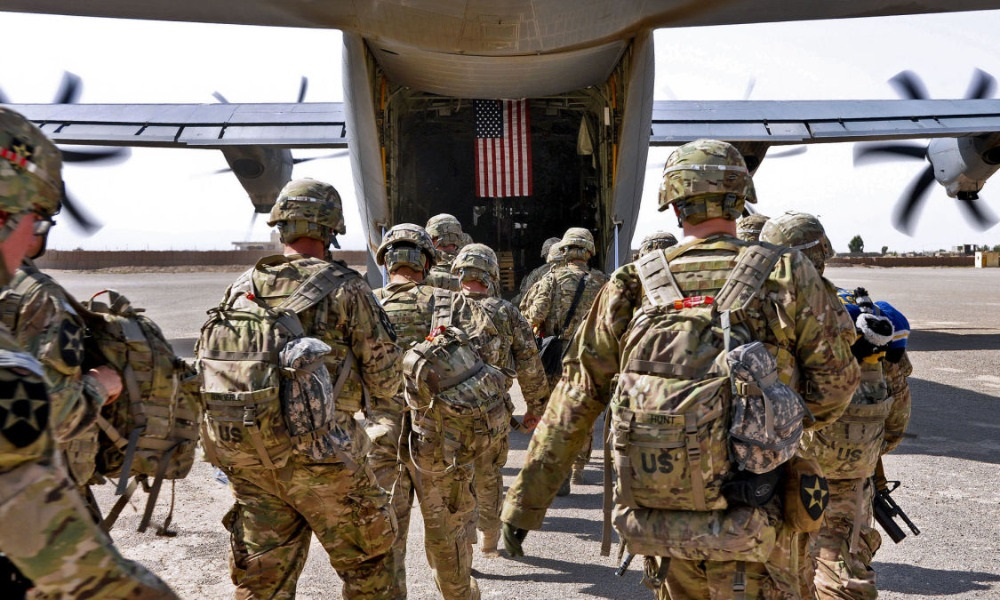US completes as much as 25% of retrograde process in Afghanistan

The US Central Command (CENTCOM) said this week that it has “completed between 16-25 percent of the entire retrograde process.”
CENTCOM said in a statement United States Department of Defense has retrograded the equivalent of approximately 160 C-17 loads of material out of Afghanistan and has turned over more than 10,000 pieces of equipment to the Defense Logistics Agency for disposition.
The US has officially handed over five facilities to the Afghan Ministry of Defense, the statement said.
The CENTCOM did not elaborate on the installations.
“For operational security reasons we will only be providing an approximate range of the percentage of the exit process that is complete,” the statement noted.
“As the responsible and orderly exit continues, the size of the range will increase to preserve operational security. This update includes the progress on the retrograde of troops and equipment from Afghanistan, the turning over of equipment and facilities to the ANDSF, as well as the destruction of some equipment,” the statement concluded.
The foreign troops’ withdrawal process started officially early this month. According to US President Joe Biden’s decision, the withdrawal process will be complete by September 11 – the 20th anniversary of the 9/11 attack on the United States.
Meanwhile, Senator Minority Leader Mitch McConnell was on Tuesday critical of US President Joe Biden’s decision to withdraw U.S. forces in Afghanistan by September 11 and warned that this decision is not underpinned by a clear plan to mitigate the risks once troops have withdrawn.
Addressing the U.S. Senate, McConnell said Biden’s decision was “dangerous, wishful thinking”.
He said the decision “is not underpinned by a coherent plan to mitigate the geopolitical and humanitarian risk that our departure will create.”
“When we are gone, after we leave, there’s every reason to believe al-Qaeda will regroup in its historic safe haven.
“Giving up the high ground while the enemy is still on the battlefield is not a strategic move. Neither is banking on conducting so-called over the horizon counterterrorism missions without presence on the ground,” he said.
McConnell said the U.S. had learned that in order to fight terrorists, it was important to have reliable access and local partnerships.
He said the U.S. military currently flies both reconnaissance and strike missions against terrorists from within Afghanistan – adding that the country is not easy to get to as the neighboring countries are Iran, Pakistan and Russian-influenced Central Asian nations.
“They aren’t exactly likely to let the U.S. base significant counterterrorism units in their country. So where will we be basing these forces? How will we maintain sorties from thousands of miles away?,” he asked.
He also said: “How many forces will be required to secure our embassy if a pro-Taliban mob threatens to overrun it. What will we do to protect it? Where will a quick reaction force be based if not in Afghanistan?”
McConnell said Washington had learned about the “tyranny of distance” from the 2012 Benghazi attack against two United States government facilities in Libya , which claimed the lives of the U.S. ambassador to Libya and another diplomat.
“If the Taliban takes Kabul, will the Biden administration recognize it as the legitimate government of Afghanistan?,” he asked, adding “will we shutter our embassy and our aid programs?”
The reality, he said, was “they don’t know. They can’t say. There’s no plan.”
He went on to state that the U.S. was in fact “abandoning” Afghanistan.
“It’s not courageous to abandon our allies,” he said.
“The horrific, horrific reports of the Taliban beginning to reimpose their version of Sharia Law are just a taste of the catastrophes facing our friends in Afghanistan who have borne the brunt of the fight.
“Human rights, women’s rights, counterterrorism, refugee flows – as far as I can tell, the administration has no plan,” he said.
He stated the world “will see it for what it is – retreating from the fight; abandoning our partners.
“This is the president’s decision. He chose a precipitous withdrawal from Afghanistan. Unbelievably, he even chose the anniversary of September 11 as the deadline.”
In conclusion, McConnell said he hopes once Biden’s team has confronted the president with the risks, he hopes “the president will think again and reconsider”.
